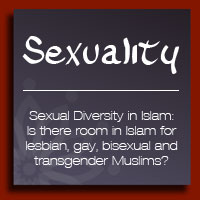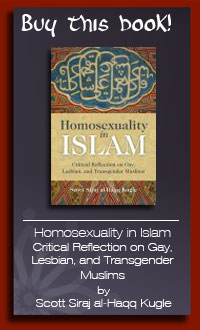





Sexual diversity in Islam:
Is there room in Islam for lesbian, gay, bisexual and transgender Muslims?
By Dr. Scott Siraj al-Haqq Kugle | Adapted for MPV by Tynan Power
© 2010 Muslims for Progressive Values
Page: 1 | 2 | 3 | Notes 1 | Notes 2 | Notes 3 | Notes 4
Is there room in Islam for lesbian, gay, bisexual and transgender Muslims?
By Dr. Scott Siraj al-Haqq Kugle | Adapted for MPV by Tynan Power
© 2010 Muslims for Progressive Values
Page: 1 | 2 | 3 | Notes 1 | Notes 2 | Notes 3 | Notes 4
Evolving Islamic thinking about homosexuality
What has led Mulims to believe that homosexuality is wrong?
There are a number of possible reasons.
•Some people feel that homosexuality is wrong because of a personal prejudice. If someone is heterosexual and only knows heterosexual people, he or she may feel that it is the only natural way to be. Without knowing any gay, lesbian or bisexual people, they may prejudge—or show prejudice—against homosexuality.
•Prejudice against homosexuality also may come from sexism. (There's more about this, below.)
•Some people believe that homosexuality didn't exist in Islamic countries until Europeans and Americans brought it there. They feel it is a kind of corruption that came from outside Islamic culture.
•Belief that homosexuality is wrong can come from trying to read the Qur'an very literally, as in the story of the Prophet Lut(PBUH).
•Some people feel that homosexuality is wrong because early Muslim scholars concluded it was. Later scholars often simply referred back to those same rulings. In that way, conclusions made centuries ago by human scholars are reinforced and continue to be followed as if they were God's absolute truth.
Some of these issues have already been addressed and others are discussed below.
Why does sexism make people believe it is wrong to be gay, lesbian or bisexual?
Sexism leads people to believe men should act certain ways and women should act certain ways. These different rules for men and women keep men in power over women, something that is easy to see in some traditional families. A sexist view of being gay sees men as "weak" if they have relationships with other men, who are considered their equals, instead of with women, who are considered inferior. At the same time, lesbians may be seen as "too powerful" and "too independent" because they are not dependent on a man.
Was homosexuality introduced to Islamic cultures by Europeans and Americans?
No. Records show that sexual diversity existed in Islamic civilizations from the earliest times. In fact, for a long time Christians in Europe used this against Muslims, calling them "permissive" (meaning "too liberal") and "sodomitical" (meaning "homosexual"). This was one of the reasons Christians were determined to reconquer Spain when it was under Muslim rule. If anything, what Europeans introduced into Islamic cultures was homophobia (fear or hatred of homosexuality) and the belief that there is something "unnatural" about being gay, lesbian or bisexual.
Isn't Islamic law the word of God?
No. It was constructed by early Muslims and based on the Qur'an, hadith (stories from the life of the Prophet) and the decisions of the early caliphs, or rulers. Islamic law also is based on culture norms, secular (non-religious) laws, and patriarchal ideas that existed before Islam and continue through to the present day.
To learn more about the basis of Islamic law, read the Literary Zikr article "Is Islamic Family Law today really based on Shari'a?" adapted from the work of Dr. Abdullahi Ahmed An-Na'im.
Isn't Islamic law something that never changes?
No! Consider these examples:
•Muslims once assumed the Qur'an demanded that Muslims be ruled by a monarch, even though it does not say so in the Qur'an.
•Muslims once thought that slavery was part of Islam, even though the Qur'an emphasized freeing slaves.
•Many Muslims have assumed that women were inferior to men, despite the Qur'an's verses that empower women.
In each case, Islamic law has evolved, in many places.
Can Islam accept homosexuality?
Yes. In Islam, there is a solid basis for respect and acceptance of diversity—including sexual diversity. Although historically many Muslim law-makers forbade homosexual acts, it is important to remember that Islamic law is not the word of God. Islamic law is the result of reasoning by law-makers, so the law is made by human beings. That doesn't mean Islamic law is not important for Muslims, but it does mean that it is not a perfect reflection of what God wants for human beings. Many Muslims do not accept homosexuality because of prejudice or sexism—and many jurists share these views. As a result, it is important to continue to re-examine the shari'ah to better understand the true meaning of the Qur'an and the example of the Prophet Muhammad(PBUH). By re-examining the principles of shari'ah, scholars—along with other believers—can help recover it's original purpose: to protect civil liberties, promote human rights and help people lead more ethical lives.
Go on to read all the definitions and explanations for this article and learn more about Dr. Scott Siraj al-Haqq Kugle.
What has led Mulims to believe that homosexuality is wrong?
There are a number of possible reasons.
•Some people feel that homosexuality is wrong because of a personal prejudice. If someone is heterosexual and only knows heterosexual people, he or she may feel that it is the only natural way to be. Without knowing any gay, lesbian or bisexual people, they may prejudge—or show prejudice—against homosexuality.
•Prejudice against homosexuality also may come from sexism. (There's more about this, below.)
•Some people believe that homosexuality didn't exist in Islamic countries until Europeans and Americans brought it there. They feel it is a kind of corruption that came from outside Islamic culture.
•Belief that homosexuality is wrong can come from trying to read the Qur'an very literally, as in the story of the Prophet Lut(PBUH).
•Some people feel that homosexuality is wrong because early Muslim scholars concluded it was. Later scholars often simply referred back to those same rulings. In that way, conclusions made centuries ago by human scholars are reinforced and continue to be followed as if they were God's absolute truth.
Some of these issues have already been addressed and others are discussed below.
Why does sexism make people believe it is wrong to be gay, lesbian or bisexual?
Sexism leads people to believe men should act certain ways and women should act certain ways. These different rules for men and women keep men in power over women, something that is easy to see in some traditional families. A sexist view of being gay sees men as "weak" if they have relationships with other men, who are considered their equals, instead of with women, who are considered inferior. At the same time, lesbians may be seen as "too powerful" and "too independent" because they are not dependent on a man.
Was homosexuality introduced to Islamic cultures by Europeans and Americans?
No. Records show that sexual diversity existed in Islamic civilizations from the earliest times. In fact, for a long time Christians in Europe used this against Muslims, calling them "permissive" (meaning "too liberal") and "sodomitical" (meaning "homosexual"). This was one of the reasons Christians were determined to reconquer Spain when it was under Muslim rule. If anything, what Europeans introduced into Islamic cultures was homophobia (fear or hatred of homosexuality) and the belief that there is something "unnatural" about being gay, lesbian or bisexual.
Isn't Islamic law the word of God?
No. It was constructed by early Muslims and based on the Qur'an, hadith (stories from the life of the Prophet) and the decisions of the early caliphs, or rulers. Islamic law also is based on culture norms, secular (non-religious) laws, and patriarchal ideas that existed before Islam and continue through to the present day.
To learn more about the basis of Islamic law, read the Literary Zikr article "Is Islamic Family Law today really based on Shari'a?" adapted from the work of Dr. Abdullahi Ahmed An-Na'im.
Isn't Islamic law something that never changes?
No! Consider these examples:
•Muslims once assumed the Qur'an demanded that Muslims be ruled by a monarch, even though it does not say so in the Qur'an.
•Muslims once thought that slavery was part of Islam, even though the Qur'an emphasized freeing slaves.
•Many Muslims have assumed that women were inferior to men, despite the Qur'an's verses that empower women.
In each case, Islamic law has evolved, in many places.
Can Islam accept homosexuality?
Yes. In Islam, there is a solid basis for respect and acceptance of diversity—including sexual diversity. Although historically many Muslim law-makers forbade homosexual acts, it is important to remember that Islamic law is not the word of God. Islamic law is the result of reasoning by law-makers, so the law is made by human beings. That doesn't mean Islamic law is not important for Muslims, but it does mean that it is not a perfect reflection of what God wants for human beings. Many Muslims do not accept homosexuality because of prejudice or sexism—and many jurists share these views. As a result, it is important to continue to re-examine the shari'ah to better understand the true meaning of the Qur'an and the example of the Prophet Muhammad(PBUH). By re-examining the principles of shari'ah, scholars—along with other believers—can help recover it's original purpose: to protect civil liberties, promote human rights and help people lead more ethical lives.
Go on to read all the definitions and explanations for this article and learn more about Dr. Scott Siraj al-Haqq Kugle.
MPV thanks the generous contribution of the Human Rights Campaign for making this adaptation possible.

